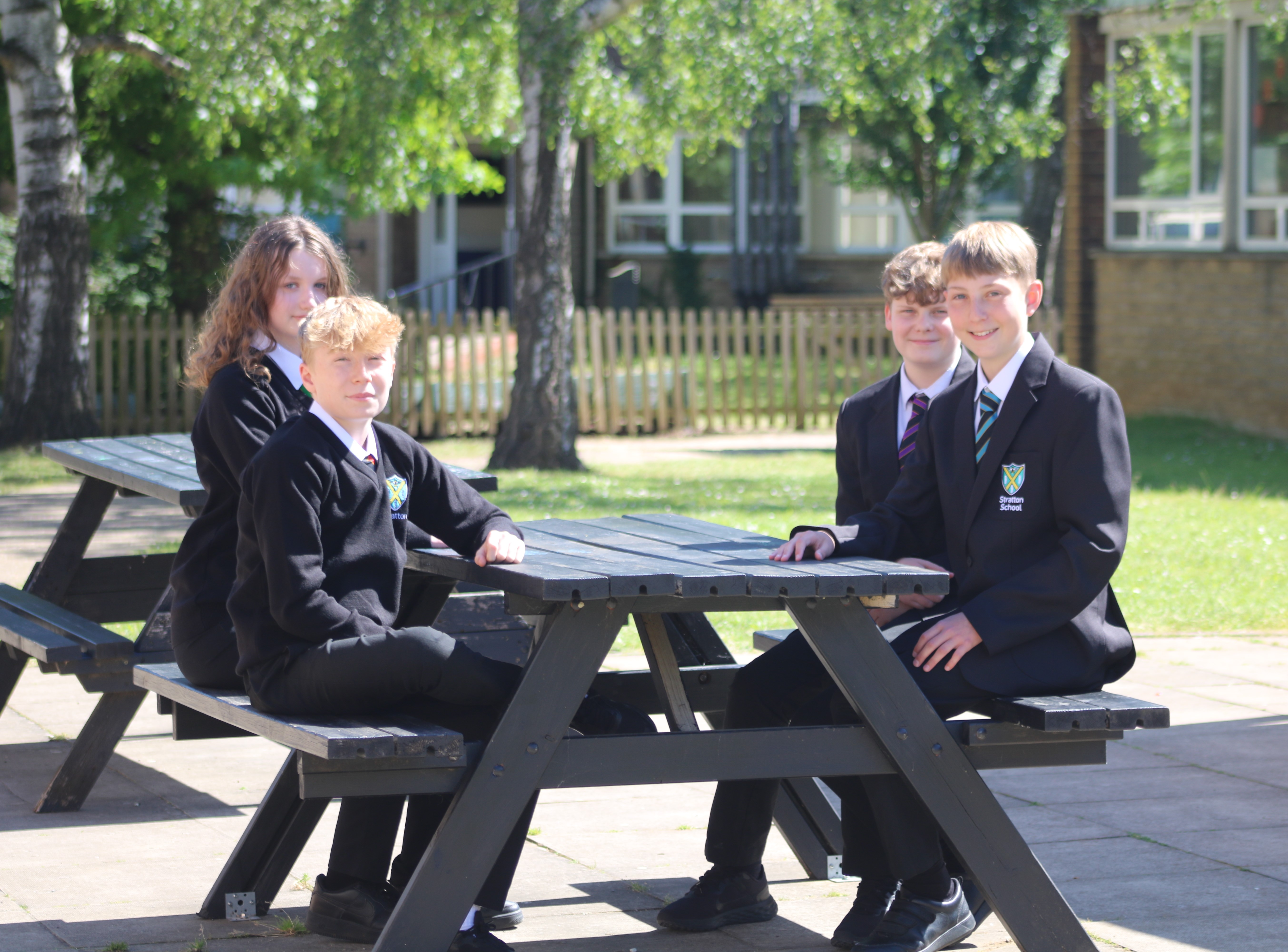
Reports & Tutor/Subject Evenings
The aim of assessment and feedback at Stratton is it supports student progress, builds learning, addresses misunderstandings and closes the gap between where a student is and where their teachers want them to be. Assessment and feedback are a crucial part of great teaching and learning.
The specific methods of assessment and feedback should be those considered by Faculty Leader and the teacher to be most appropriate for the specific curriculum being taught. For example, research shows that verbal feedback and carefully managed peer and self-assessment are an important part of securing progress, as well as written marking of books, folders and online work.
Whilst we hold the traditional annual events such as a tutor evening and subject teacher online conference, if you need to speak with us on a matter relating to your child, please just email us; we are always happy to talk with you.
As a rule of thumb, most sessions will run on a Thursday.
Tutor Evening
Tutor Evening provides an opportunity for new students to discuss their wellbeing and broader personal development with their tutor linked to their first round of Progress Reports and Academic Mentoring. Parents attend these meetings with their child and have the opportunity to raise any relevant concerns. These sessions are held on site, face to face.
New Families – Information Evening
This is an event for new families to hear from the school on how we operate our curriculum and assessment programmes. You will here from the SLT and Key leaders across the school, and there will be opportunities to discuss specific queries 1:1
Subject Consultations
Parent teacher consultation evenings are held once a year for each year group and provide an opportunity for parents and students to meet with their class teachers to discuss progress in individual subjects.
Options Evening
This is a GCSE information evening to support parents and students in preparing for their option choices the following year.
IAGs
Information, Advice and Guidance evenings are specifically targeted in Year 11 to ensure all students have the support needed with their post 16 destinations alongside the support strategies needed to maximise success in their GCSE outcomes.
Ad hoc Consultation
Parents are welcome to contact the school to discuss their child’s welfare and progress at any time. In general, the first point of contact should be your child’s form tutor. For subject specific queries, the class teacher is the contact point.
Open Evenings
These are held in the Autum term. Our first event will be for new Year 7s joining us in 2025. This will be held on Thursday 17th October. Our second open evening will be held on Thursday 7th November for Year 11s considering an application to the Matt King Sixth Form.
Academic Mentoring
At key points across the year your child’s tutor will meet with your child to discuss their latest report, progress and how they are feeling about school. This will be shared with you via email and uploaded to our careers portal, Unifrog.
Reporting and Assessment overview
At Stratton we report throughout the year to families, providing information on how students are progressing. Our cycle changes between key stages, but each Progress Report contains the following information:
· Current Attainment
· Rewards and Conduct Summary
· Attendance
· Reading age
· Attitude to Learning
· PLEDGES
What is meant by 'expected progress'?
At Stratton we aim to ensure that pupils make at least expected progress in all their subjects between the end of Key Stage 2 (Year 6) and the end of Key Stage 4 (Year 11). We always aim to set targets that are aspirational but achievable. We also emphasise that a target is the minimum we expect students to aim for, not a ceiling on their achievement.
We use a range of information about your child to set these targets and keep them under review as your child progresses through Key Stage 4 (Years 9-11). Usually they reflect at least the ‘expected progress’ that your child should make from their different starting points when compared to similar children nationally. However, we will also review our own assessments of their progress since joining the school, or other contextually important information to set the right goals.
How will I know my child is making progress over a year?
Over the course of the year, you will receive tracking reports for your child that clearly indicate if they are making progress. For Year 7 this will be shown by students being tracked with a ‘P’ mark (making expected progress) or a ‘P+’ mark (making better than expected progress). For Years 8-11 the progress they are making is linked to the student’s minimum target grade.
What grades should my child be aiming for?
This depends on their previous attainment. For college courses, training or apprenticeships, students should always check the individual requirements. However, a majority of the 16-19 courses we run require a particular number of GCSEs at grade 5 and above. For example, many academic or ‘A’ level programmes of study require at least five GCSEs at grade 5 or above including English and mathematics. Particular grades may also be required in subject areas that your child wishes to study post 16. Appropriate Information Advice and Guidance (IAG) will be provided throughout Key Stage 4 to help guide students and parents through this process.
Pledges
PLEDGES is an awards system which offers students a range of character-building opportunities that enhance their learning and development. We want, and expect all students to participate in at least one after school club as part of the PLEDGES Programme so that they can benefit from the skills and personal qualities that these clubs help to develop. We have developed and invested in a simple but broad set of Academy Pledges that students are expected to complete during the course of their time at the school, at Bronze, Silver and Gold levels which will be added to your child’s report.
Key Stage 3 Reports
For each subject your child will receive a Current Indicator of Attainment (CIA) comment. This is based upon prior attainment and assessments, as well as recent work in the subject. From this the CIA indicates what the class teacher feels is the most likely final outcome at the end of Year 11, and indicates the long-term trajectory for achievement. In the table below, one of the four comments in the first column will be on the report for each subject.

Each subject will also have a progress indicator which will focus on the progress your child has made from their starting point in the year. This measure will be based on the work that has been produced, assessments in lessons and how the teacher feels the student is progressing; in other words is the student currently making the expected progress to meet the CIA by the end of year 11. Progress will be measured using the following scale.

Key Stage 4 /5 Reports
At Key Stage 4 we report on predicted attainment (ECP = End of course prediction) in the form of a grade or letter depending on grade system used for GCSE or vocational subjects.
Attitude to Learning (AtL)
An assessment of this student’s attitude towards – and engagement with – the subject. AtL grades will reflect a number of indicators including effort and application in lessons, verbal contributions, quality of written work, and focus and engagement.
Grade Definition
1
Excellent: This student always gives their best effort in the completion of their classwork. This student is focused and attentive in lessons, showing an excellent level of engagement. They engage positively with their lessons, regularly participate in class discussion, and work well with their peers.
2
Good: This student mostly gives their best effort in the completion of their classwork. This student is mostly focused and attentive in lessons, showing a very good level of engagement. They engage positively with their lessons, making good contributions and working well with their peers.
3
Requires Improvement: This student sometimes gives their best effort. This student gives inconsistent focus and is not always as attentive in lessons as they should be, which is undermining their progress. They mostly engage well with their lessons, but there is room for improvement.
4
Cause for concern: This student rarely gives their best effort, either not completing the work set or producing work below their capability. This student often lacks focus in lessons and may disrupt the learning of others. This student must engage more positively with their lessons.
At the time of writing, we are confirming all dates. Some will be subject to change. We always confirm with a letter / email
